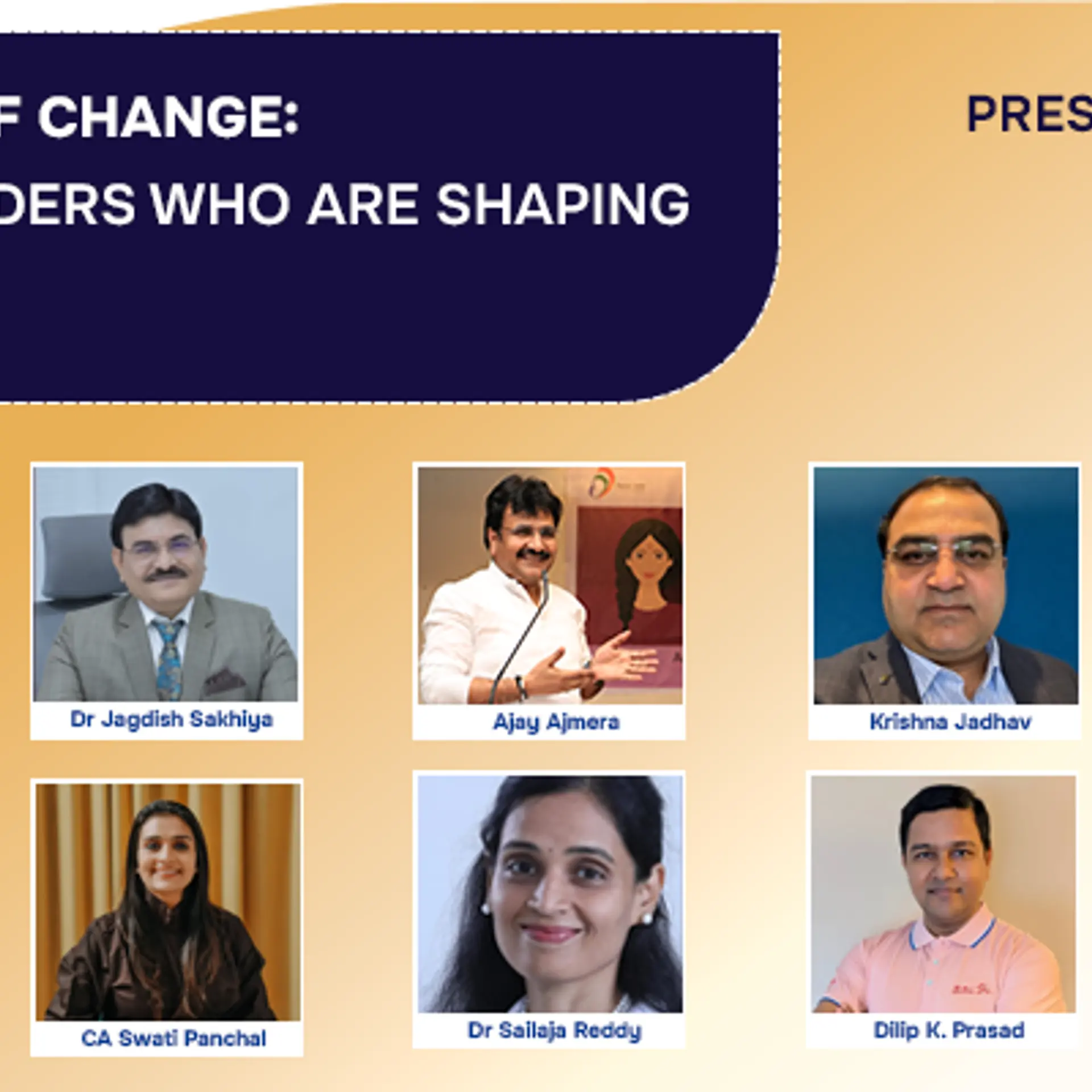YourStory Top 25 Newsmakers of 2018: startup founders who’re set to continue making the headlines in 2019
YourStory Top 25 Newsmakers of 2018 lists startup founders who led their firms to new heights in 2018 and who, we believe, will steer their companies to even greater heights in 2019 and continue to dominate the headlines this year too.
“Year's end is neither an end nor a beginning but a going on, with all the wisdom that experience can instil in us.”
This quote by American author Hal Borland captures the essence of continuity, consistency and growth – all of which we saw unfold in the Indian startup ecosystem in the year 2018.
The year that was, was indeed, a landmark for the Indian startup ecosystem. It was the year we saw the momentum of exits reach new heights. It was also the year we saw several soonicorns become unicorns, even as new soonicorns emerged from the fray. In 2018, we saw startups inch closer towards profitability and some even achieve it. We saw startups across sectors and in various stages receive funding from Indian investors, with great interest and participation from their global counterparts.
In many regards, in 2018, we saw the maturing of the Indian startup ecosystem, with startups saying out loud that they are ready to compete on a global scale. And through all this, in 2018, we saw founders of Indian startups leading from the front. There was a show of confidence and security they displayed, which made them an inspiration for thousands, if not millions, to follow their dreams.

YourStory is, therefore, proud to present YourStory Top 25 Newsmakers of 2018, our list of 25 leaders from the Indian startup world who dominated the headlines in 2018 by setting new benchmarks and hitting new milestones for their companies.
The successes and accomplishments of these 25 pioneers of the Indian startup ecosystem did not by any means come about overnight. These have taken years in the making but they’ve helped cement the Indian startup ecosystem’s position as a prominent player on a global scale. Indeed, we believe, these top 25 newsmakers of 2018 will steer their companies and the Indian startup ecosystem to greater heights in 2019, by touching new milestones and setting new benchmarks in the year ahead.
#1. Binny Bansal and Sachin Bansal
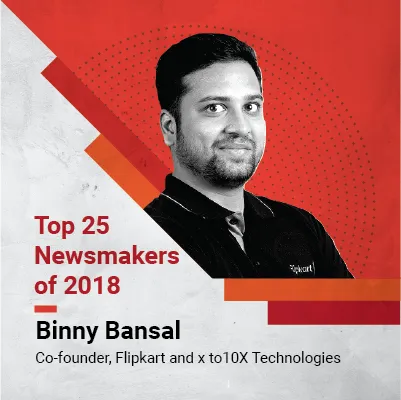
Milestone: Engineering the world’s biggest e-commerce deal with the acquisition of Flipkart by global retailer Walmart and for starting up again in the same year
Who: Binny Bansal, Co-founder, Flipkart and xto10X Technologies, and Sachin Bansal, Co-founder, Flipkart and BAC Acquisitions
Why: 2018 was an eventful year for the poster boys of the Indian startup ecosystem, as Flipkart – the ecommerce company they started in 2007 – was acquired by Walmart in a deal that valued the company at over $20 billion. The duo built Flipkart for over a decade to create a new icon in the Indian e-commerce sector, and this year, set yet another benchmark for the industry with the successful acquisition of Flipkart by global retailer Walmart. The Flipkart-Walmart deal, which is the largest-ever ecommerce deal, set new benchmarks for the Indian startup ecosystem and for the ecommerce industry in terms of deal size and returns.
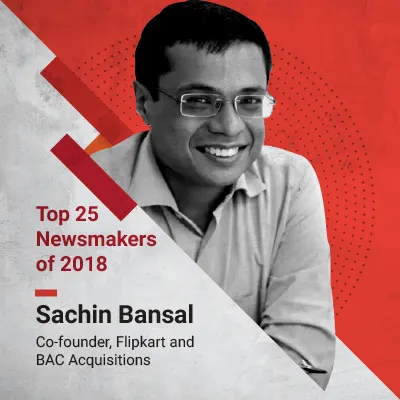
While Sachin left the company after the deal, Binny, who had stayed on as Group CEO and Chairman, resigned in November on a controversial note that, however, did little to dim his stature in the startup ecosystem. Both Sachin and Binny have since proven that they do not intend to rest on their past laurels. In December, Sachin registered his latest venture, BAC Acquisitions, a holding company through which he will look to spread his knowledge and wealth in ventures of interest. Sachin’s latest venture will certainly be a thing to watch for in 2019, as the techie from IIT has a demonstrated experience in navigating startups from ground zero to multi-billion-dollar exit. Similarly, Binny too is donning a new role with his latest venture xto10X Technologies, which will provide advice, technology, and knowledge to growth-stage startups with the potential to scale. Both their latest ventures will be of interest for keen industry watchers, as will be the dominance of Flipkart, the company the duo originally founded.
#2. Vijay Shekhar Sharma, Paytm
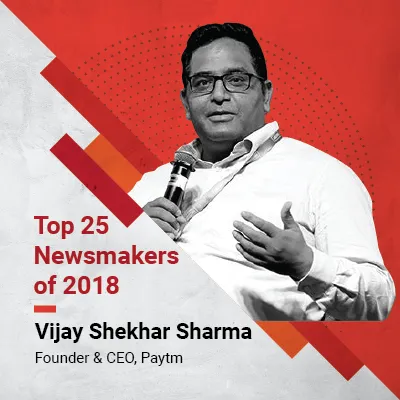
Milestone: Warren Buffett’s Berkshire Hathaway bets on Paytm and the launch of Paytm Money
Who: Vijay Shekhar Sharma, Founder, Paytm
Why: Outspoken, witty, and a sharp business sense and acumen: these are the qualities that have defined Vijay Shekhar Sharma since founding Paytm in 2010. This year has been a continuation of Paytm’s dominance in the digital payments space from last year and its successful expansion into newer areas. The company said it touched an annual run rate of 5 billion transactions a year, with $50 billion of annual gross transaction value. However, the moment of exalted glory was when legendary investor Warren Buffett’s investment firm Berkshire Hathaway picked up a stake in Paytm, making it the first Indian startup that the firm has bet on. Outside of the wallet business, Vijay is also leaving no stone unturned to create a similar impact in the payments bank and the e-commerce business, making inroads for Paytm in newer domains and surprising industry-watchers and established rivals at every turn – something he is set to continue to do in the year ahead. One need only listen to Vijay’s quotes from his fireside chat at YourStory’s Techsparks 2018 to understand what new horizons he can take his company to. He said, at the time, with a flourish and in his inimitable style, “Many said you don’t have an MBA in your team, how will you build a brand? Jab Bansals [of Flipkart] ne century maar di, people would tell me. 'You can’t raise money, Vijay.' Woh baat maine dil pe le li…Isliye aaj Jack Ma, isliye Masayoshi Son, isliye Warren Buffett. Dekho main kahan se paisa leke aaya.”
#3. Ritesh Agarwal, OYO Rooms
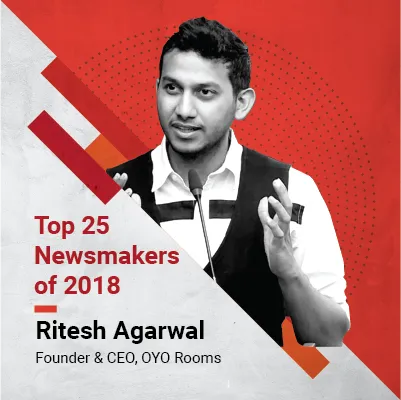
Milestone: Infusion of $1 billion funding with a 5x valuation jump
Who: Ritesh Agarwal, Founder and CEO, OYO Rooms
Why: All of 25 years, Ritesh Agarwal, the founder of OYO Rooms, is on top of the world. This year was truly remarkable for Ritesh as Oyo’s valuation jumped to $5 billion after it secured a $1 billion investment in a funding round led by SoftBank Vision Fund. One should recall that in 2017, Oyo was inching close to the unicorn club but this was almost an unbelievable jump. Secondly, it was also the year, when Oyo aggressively moved into territories outside of the home market into South East Asia, China, and West Asia. This expansion also should be understood in the context that Oyo has more rooms in China than in India. Most importantly, Oyo, despite being a young startup, has managed to attract key talent like Aditya Ghosh, the former CEO of IndiGo Airlines, into its fold. All these milestones give Oyo a strong platform to enter 2019.
#4. Bhavish Aggarwal, Ankit Bhati, Ola
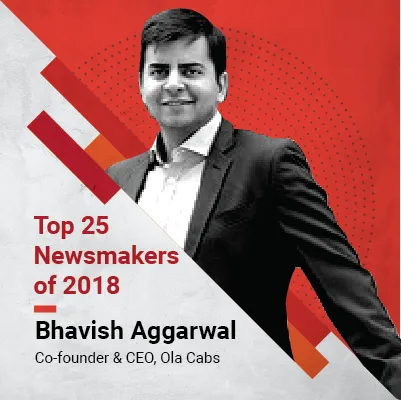
Milestone: Overseas expansion and growth of associate businesses
Who: Bhavish Aggarwal and Ankit Bhati, Founders, Ola
Why: Bhavish, who is one of the 2018 TIME 100 list of most influential people, has made steady progress in steering Ola’s expansion into overseas markets while making aggressive moves into associated business this year. Ola’s overseas expansion, which kicked off with Australia, was quickly followed up with the launch into New Zealand and the United Kingdom. These forays were seen as bold moves, especially given the tough competition it faces in these markets from its rival Uber. Besides, Ola has been quietly expanding into its food delivery business, with Foodpanda acquiring Hola Chef. Bhavish also has strong intentions in venturing into new areas in the future by investing $100 million in scooter sharing company, Vogo. Ola’s steady expansion into newer geographies and moves to grow their associate businesses suggest there’s more to come from Ola in 2019.
#5. Hari Menon, Vipul Parekh, V S Ramesh, Abhinay Choudhari and V S Sudhakar, BigBasket
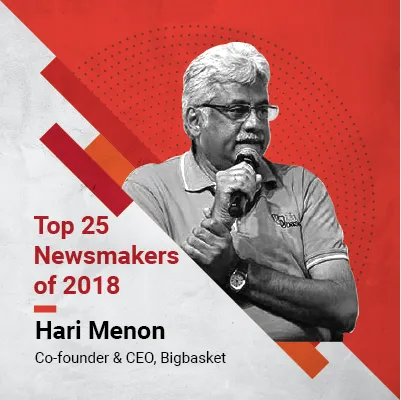
Milestone: Funding from Alibaba and entry into micro-delivery
Who: Hari Menon, Vipul Parekh, V S Ramesh, Abhinay Choudhari and V S Sudhakar, Co-founders and CEO of BigBasket
Why: Grocery delivery startup BigBasket started the year 2018 with a bang by securing funding of $300 million led by the Chinese e-commerce giant Alibaba. This investment also helped BigBasket inch closer to unicorn status. In 2018, its founders also made some notable strategic moves, particularly BigBasket’s foray into micro-delivery, having made three acquisitions of milk delivery companies and a smart vending machine startup during the year. BigBasket also lined up plans to hit a GMV of $1 billion by 2020, meaning there’s a lot more to come from BigBasket. As aptly put by Hari Menon, who has been the public face of BigBasket: “Version 2.0 (of BigBasket) is all about growth. We want to pump in money into three things — marketing, infrastructure and scaling up tech.”
#6. Sujeet Kumar, Amod Malviya and Vaibhav Gupta, Udaan
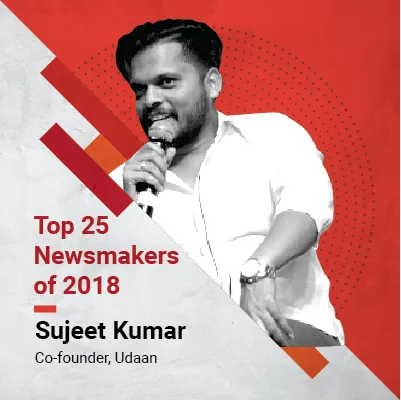
Milestone: India’s fastest unicorn
Who: Sujeet Kumar, Amod Malviya and Vaibhav Gupta, Co-founders, Udaan
Why: Sujeet, Amod and Vaibhav, three former executives of Flipkart, created waves in the Indian startup ecosystem by achieving unicorn status for their B2B marketplace venture – Udaan – in 2018. This milestone was reached in just 26 months of their registration, making it the fastest-ever for an Indian startup. This reveals the kind of faith that investors have in this startup who is very rapidly disrupting the B2B space. Sujeet Kumar’s highlighted the opportunity Udaan capitalised on in a statement he made during TechSparks 2018: “I realised I was a person of execution. Every time I would consult with the portfolio company on execution, I would feel I should execute it. Then I thought I needed to start again. We nailed down B2B ecommerce in India because it is a unique proposition where 50 million small businesses are there with an easy internet play and yet it is hard to execute.”
#7. Ankush Sachdeva, Farid Ahsan and Bhanu Pratap Singh, ShareChat
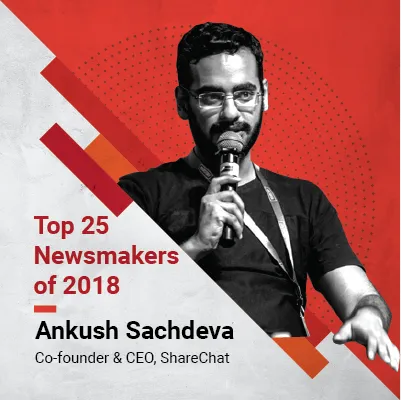
Milestone: Putting vernacular content on the forefront
Who: Ankush Sachdeva, Farid Ahsan, and Bhanu Pratap Singh, Co-founders of ShareChat
Why: ShareChat was seen as a long and risky bet three years ago when it decided to build on regional content or in what is more popularly known as the vernacular language space. Their gamble has paid off, demonstrating their keen understanding of how Indians are increasingly becoming more comfortable with the idea of communicating in their local language as also their early understanding of the growing number of digital users set to emerge from rural India. This was also very enthusiastically affirmed by the investor community when China’s Shunwei Capital led a $100 million funding infusion into ShareChat. This startup, which enjoys the backing of 25 million active users, plans to reach 100 million users very soon. All this has happened even though there are more dominant and established social networking platforms like Facebook and Whatsapp. As proof of ShareChat’s potential to see further growth, here’s what an early investor into ShareChat had to say about the startup: “When I first met them, what struck me was their understanding of the Indian user, a user they knew very closely having lived and studied in the non-metro India.”
#8. Sriharsha Majety, Nandan Reddy and Rahul Jaimini, Swiggy
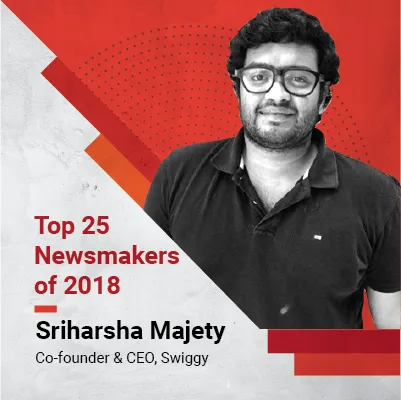
Milestone: Over $1 billion in funding in 2018, 4x valuation jump and the launch of more services/features
Who: Sriharsha Majety, Nandan Reddy and Rahul Jaimini, Co-founders, Swiggy
Why: Swiggy just swung the tide in its favour during this year, with a large capital infusion, which for a four-year-old startup is a particularly notable achievement. The year 2018 can be rightly regarded for Swiggy as its fundraising period, which came about in three rounds, with the company closing the year on a real high as it received a $1 billion funding infusion in December. This helped its valuation soar from $700 million to $3.3 billion. All these milestones give Swiggy a strong platform to further cement its position in the food delivery segment and enhance its ability to offer an assortment of services to the marketplace. In the process, it has also built a solid wall to fend off competition from its rivals and is now poised to take on more opportunities to grow, which we, in turn, expect will mean Swiggy will continue to dominate the space in 2019.
#9. Deepinder Goyal, Zomato

Milestone: From soonicorn to unicorn with the $410 million funding
Who: Deepinder Goyal, Founder & CEO, Zomato
Why: 2018 has been a good year for Zomato, the company Deepinder Goyal founded, with the restaurant discovery and food delivery startup achieving unicorn status. The company received funding of $410 million, helping it turn a unicorn and testimony that perseverance pays as Zomato went through a trough at one time and had to rework its plans before emerging a winner once again. This year, Deepinder’s Zomato has been hitting all the right notes and got its rightful place among the hallowed names of the Indian startup ecosystem. In Deepinder’s own words, “It is all about being part of every value in the food chain. Zomato needs to be a complete food business; that means owning the complete chain. The idea is to get better food for more people every day. In the process, we need to work and partner with our restaurant partners, and give them solutions.”
#10. Mukesh Bansal and Ankit Nagori, Curefit
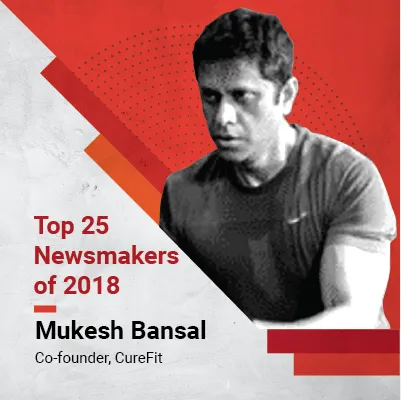
Milestone: Creation of strong brand in the fitness space
Who: Mukesh Bansal, Ankit Nagori, Co-founders, Curefit
Why: Mukesh Bansal has built a vibrant business around the fitness phenomenon, which is the new mantra for millennials, with fitness being a serious goal besides one’s career. Mukesh has consistently displayed an ability to spot an opportunity much before others and build a strong business around this with sound fundamentals. It has happened earlier with Myntra, an online apparel destination, and now with Curefit, his latest venture. He’s well supported by the experienced Ankit Nagori, who was the Chief Business Officer of Flipkart in his previous role. In their plans to grow the business, Mukesh’s Curefit follows this very simple rulebook: “Living a healthy lifestyle involves a lot of work, so people who are extremely motivated are able to pull it off as they know where to go and what to do next. But not everyone is that motivate. So, if we want to help people solve their health problems, we need to make it really easy for them. Curefit acts as one platform where everything is available. We want to be an end-to-end healthcare focussed platform.”
#11. Yashish Dahiya, PolicyBazaar
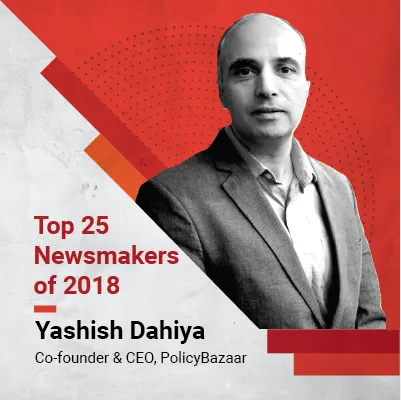
Milestone: Entry to the unicorn club and the launch of DocPrime
Who: Yashish Dahiya, Co-founder and CEO, PolicyBazaar
Why: PolicyBazaar has traversed a very fruitful journey over the last 10 years to become the latest entrant into the unicorn club in 2018. The year 2018 was also interesting for Yashish from an investment perspective, with SoftBank infusing over $200 million into the company. An active participant of the Ironman Challenge, Yashish brings the same intensity and fitness to his financial services venture. Given the depth and breadth of the financial services segment, Yashish has branched out into other segments like loans advisory and healthcare, after establishing PolicyBazaar’s base as the leading insurance aggregator. PolicyBazaar claims to be selling nearly 25 percent of India’s life insurance cover, with a hold over 7 percent of India’s retail health insurance business. PolicyBazaar infused $50 million into its new healthcare venture DocPrime. On the reason for SoftBank investing into PolicyBazaar, Yashish says, “What they really liked was the execution of the company. When we started PaisaBazaar four years back, we weren’t the market leader. But today we are.”
#12. Byju Raveendran, Byju’s
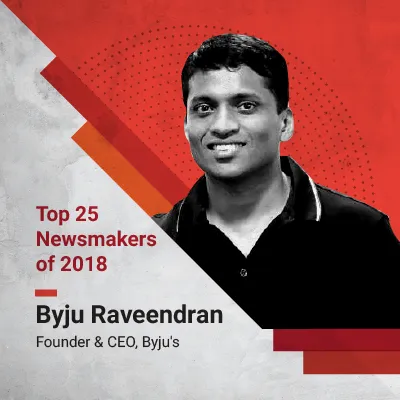
Milestone: Most valuable edtech startup globally
Who: Byju Raveendran, Founder, Byju’s
Why: Byju Raveendran brings a sense of passion to his venture and this has only made his edtech business soar higher, hitting new records in 2018 and with bigger ambitions lined up for the years ahead. In 2018, the startup received a $540 million fund infusion that put the company’s valuation at $3.6 billion, making Byju’s the most valuable edtech startup in the world. It’s worth noting that this edtech venture, which was launched in 2011, had first entered the unicorn club in March 2018, so it has been a very steep climb. Byju’s also claimed that it has turned profitable, after crossing Rs 100 crore in monthly revenue in May 2018. The company has been recording a growth rate of 20 percent on a monthly basis and has revised its annual revenue target to Rs 1,400 crore.
#13. Kabeer Biswas, Ankur Aggarwal, Mukund Jha and Dalvir Suri, Dunzo
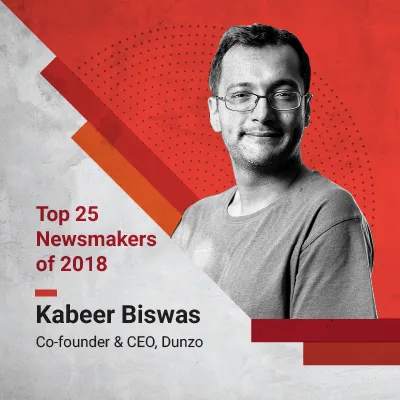
Milestone: Steady rise in popularity and making ‘dunzo’ a verb
Who: Kabeer Biswas, Ankur Aggarwal, Mukund Jha and Dalvir Suri, Co-founders, Dunzo
Why: It was hard to imagine that a simple task like dropping off something could emerge as a strong business model and attract the interest of a global tech giant like Google as an investor. It is here Dunzo comes into play, marrying technology with simple mundane tasks of picking up something and saving you precious time. Dunzo is a hyperlocal concierge app which works on one principle - getting your task done in the quickest possible time. What started as a hyperlocal personal task management platform in Bengaluru on WhatsApp is now a full-fledged automated app-based service present in several other cities, including Gurugram, Hyderabad, Pune and Chennai. As Kabeer says, “Running tasks like picking laundry and doing pickups and drops for over a year helped me really understand the time it takes. I also realised the process could be optimised with technology.”
https://yourstory.com/2018/12/dunzo-growth-2018-automation-machine-learning/
#14. Ketan Kapoor, Mettl
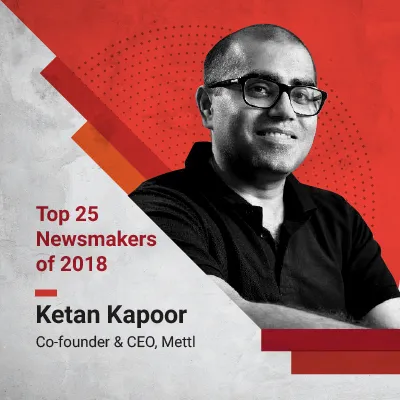
Milestone: Successful exit for a startup founder and 7x return for early investors
Who: Ketan Kapoor, Co-founder, Mettl
Why: Mettle, an HR tech startup founded in 2010 by Ketan and others, had a very successful exit in 2018, with the company being acquired by the global player, Mercer. The value of the transaction, at around Rs 300 crore, is certainly not a big number when there is so much attention to billion-dollar funding or exits taking place in the market, but it made very clear business sense. This transaction brought a 7x return for the early investors in Mettl, which is the kind of optimal return any stakeholder is always aiming for in an environment which is starved of exits. As one of the seed investors accurately summed up about this deal: “Look at the cycle. To me, the state is most important where everyone gets an outcome, be it Mercer who will get to build globally on the assessment play, be it the founder, key employees or all the investors.”
#15. Harsh Jain and Bhavit Sheth, Dream11
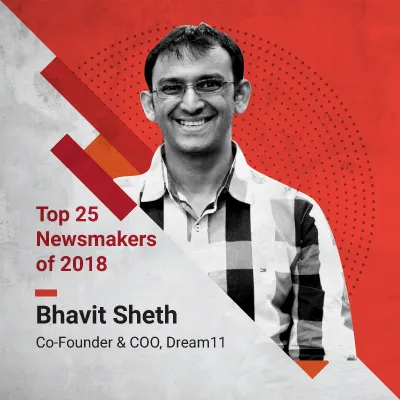
Milestone: Securing $100 million funding in Series D and dominance in the gaming industry
Who: Harsh Jain and Bhavit Sheth, Co-founders, Dream11
Why: Dream11 as a fantasy sports game company reached a new high this year by securing $100 million in funding, which was led by Chinese internet giant Tencent. This is a strong endorsement for a startup which started operations in 2012. Dream11 today boasts of a subscriber base of more than 40 million users who play games like cricket, football, kabaddi, and basketball. An early investor in this startup had this to say: “As an investor in Dream11, a leading fantasy sports game company, I realised that if you create a great experience, users will spend time on the site and pay too. As an early stage investor, I try to learn and study deeply sectors that might emerge and create disruptive companies.”
#16. Kunal Shah, CRED

Milestone: Launch of second fintech venture after successful first exit
Who: Kunal Shah, Founder & CEO, CRED
Why: There is always a sense of excitement when a successful entrepreneur begins his second innings. Kunal Shah is a perfect example of this, as we saw enough buzz in the ecosystem when he announced his new fintech venture – CRED, which he describes as a place to celebrate and reward the most creditworthy people of India. Kunal was one of the early movers in the fintech space, having set up Freecharge which was later acquired by Snapdeal. Today, Kunal once again plans to be the disruptor in the fintech space and his latest venture has evinced considerable interest from investors, from the likes of Sequoia Capital, Ribbit Capital and others, with funding to the tune of $30 million. In his own words on CRED, Kunal says, “"I felt the need to create a system that rewards trustworthy and creditworthy individuals of India and inspires others to be like them… Welcome to CRED. A community where, for the first time ever, members will actually be celebrated and rewarded for paying their credit card bills." Kunal’s CRED, although still in beta stage, has already received a lot of accolades for its ease of use, with day 5 of its payment volume almost equaling that of FreeCharge at the time of exit, after five years into its journey.
#17. Ashish Kashyap and Pratiksha Dake, INDWealth
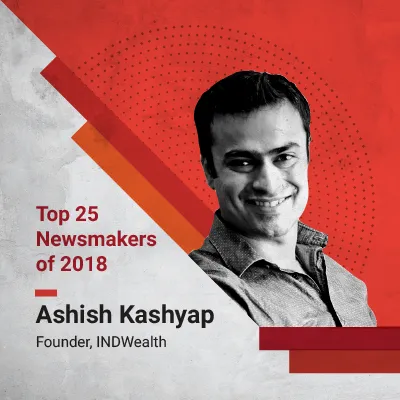
Milestone: Buzz created with launch of new wealth tech platform
Who: Ashish Kashyap and Pratiksha Dake, Co-founders, INDWealth
Why: Ashish’s career profile is like a gold standard for any aspiring entrepreneur, with experiences cutting across online travel, fintech and working for a search giant. He successfully exited from the travel tech venture ibibo group, which was touted as a significant acquisition in the Indian startup ecosystem. His latest foray in 2018 into the fintech space with the co-founder Pratiksha Dake, with a focus on personal wealth segment, has made everybody sit up and take notice, as they keenly watch out for his next move. Not to forget that investors have already backed the startup with $30 million funding. In Ashish's own words, “Whenever I think of a sector, it needs to be a large enough opportunity. Definitely, financial services is a large opportunity. That is the first thing. The second thing is that I need to personally live the pain for me to get excited about the problem. It was what I did with GoIbibo, despite the fact that there were many players in the space, same with Ibibo Pay, which is now PayU.”
#18. Ankur Jain, Bira 91
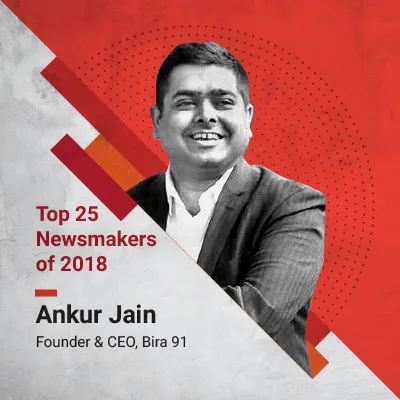
Milestone: An independent India beer brand amidst global names
Who: Ankur Jain, Founder & CEO, Bira 91
Why: Ankur Jain can be regarded as the trailblazer in India’s entrepreneurial ecosystem and as somebody who defied conventions, with his success in creating a strong beer brand, which despite strong competition from established brands, has still managed to become a household name. Smart branding exercise, with quirky positioning, has given Bira 91 a cult following in India. In 2018, Bira 91 raised $50 million from Belgian investment firm Sofina, taking its total funding since inception to $100 million. A passion for the brewing business led Ankur to import brands from overseas and also gave him a good understanding of consumer taste. “We figured that there were certain kinds of beers that really worked with Indian consumers. So, I felt that there was a need to create high quality and great tasting beer, which resonated with the youth.”
#19. Tarun Mehta and Swapnil Jain, Ather Energy
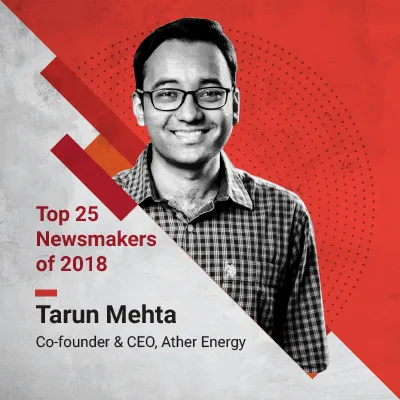
Milestone: Successful launch of India’s first smart scooters in 2018
Who: Tarun Mehta, Co-founder & CEO, and Swapnil Jain, Co-founder & CTO, Ather Energy
Why: Tarun Mehta and Swapnil Jain, who started Bengaluru-based Ather Energy in 2013 to build India’s first electric two-wheelers, finally launched their much-awaited Ather 340 electric scooter in June 2018. The launch comes more than two years after Tarun first unveiled the Ather 340 in February 2016, promising at the time that the scooter would be available by the end of that year. However, the team realised at the time that the product they had unveiled was a whiteboard version and that these specifications were very different from what could be used on the road. “Apart from on-road difficulties, we realised production generally ended up being the graveyard for most hardware and electric vehicle startups,” Tarun said, alluding to the production difficulties the company faced.
However, Ather Energy, which is backed by Hero MotoCorp, Flipkart founders Binny Bansal and Sachin Bansal and Tiger Global, not only launched the Ather 340 in 2018 but also launched a new, more powerful electric scooter, the Ather 450 – which came as a surprise to industry-watchers.
The company is reportedly also making a new range of electric two-wheelers that may be launched by 2020-2021, with plans to foray into the electric motorcycle segment – all developments that would see it make the headlines in 2019 too
#20. Samay Kohli and Akash Gupta, GreyOrange
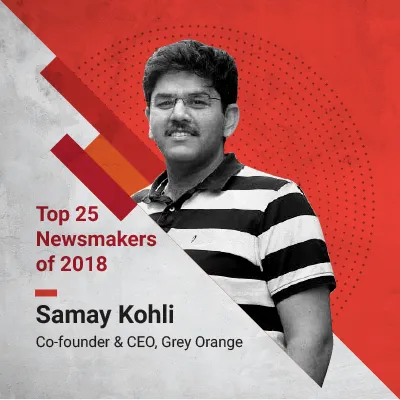
Milestone: Emerging leaders in the enterprise hardware ecosystem
Who: Samay Kohli, Co-founder & CEO, and Akash Gupta, Co-founder and CTO, GreyOrange
Why: Founded in 2011 by Samay Kohli and Akash Gupta, GreyOrange has today become a global leader in AI-powered robotics company. This year, the company raised $140 million in Series C funding, which is the largest round to have been raised by an industrial robotics firm. GreyOrange also has major R&D centres in India, Singapore and the U.S., and expects to continue to invest heavily in R&D to solve new problems for customers and help transform the industry. Companies like GreyOrange today enjoy a competitive edge as a growing number of companies are seeking out intelligent robotics solutions to enjoy higher productivity and efficiency rates in light of the ongoing e-commerce and omnichannel boom.
Samay said, “GreyOrange offers robotics technology for operating flexible, automated warehouses and has the largest market share globally in this space. We’ve grown rapidly in recent years and will accelerate the expansion of our regional teams, especially within the U.S. We strongly believe in thinking global but operating locally.”
Samay and Akash have been recognised as top 35 global innovators by MIT Technology Review, while GreyOrange has been recognised as one of the world's Top 50 Robotics Companies since 2016.
#21. Sumant Sinha, Renew Power
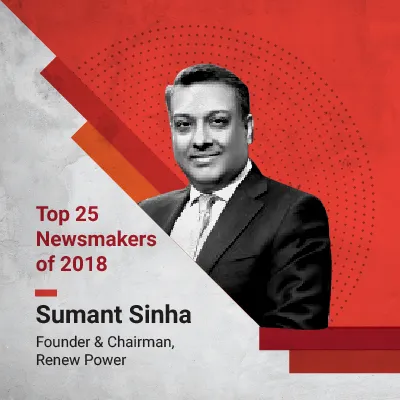
Milestone: Leader in the renewable energy sector in India
Who: Sumant Sinha, Founder & Chairman, Renew Power
Why: Sumant Sinha, who founded ReNew Power Ventures, has steered the cleantech company in the past six years to make it the No. 1 renewable energy company in India over a short period of time. Sumant, an alumnus of IIT-Delhi, Columbia University, and an IIM-Calcutta, and a CFA charterholder, has built ReNew Power into India’s largest renewable energy independent power producer (IPP) with a clean energy capacity of over 5,800 MW of solar and wind power assets across India.
“In the last six years, ReNew Power has emerged as the largest renewable energy IPP in India in terms of total energy generation capacity. All our projects are commissioned in line with the highest quality standards and engineering capabilities. We are proud to be a responsible organization that is committed to supporting the communities in which we live and work. We are at a turning point where transformational use of natural resources of energy will define our future. The years ahead will define ReNew Power’s role in altering how energy is produced, transmitted and distributed in this country.” Sumant Sinha.
#22. Girish Mathrubootham and Shan Krishnaswami, Freshworks
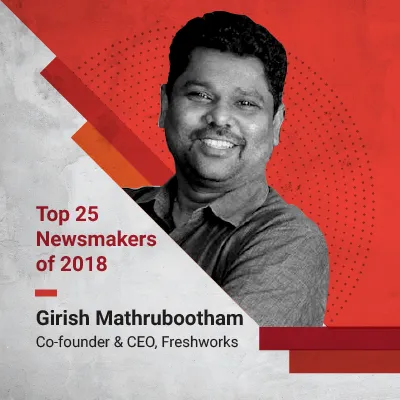
Milestone: Soaring revenues and competing with global giants
Who: Girish Mathrubootham, Co-founder and CEO, and Shan Krishnaswami, Co-founder and CTO, Freshworks
Why: Girish Mathrubootham and Shan Krishnaswami, who founded Freshworks in 2010, then called Freshdesk, have led the software-as-a-service (SaaS) startup to become a key global player, catering to more than 150,000 businesses, including hallowed names such as Cisco, Honda, University of Pennsylvania, Toshiba and Hugo Boss, amidst a slew of small and medium businesses in U.S. and Europe. The company, which launched over eight years ago with just one product, is today a global leader in customer engagement software, with an entire suite of customer engagement offerings. In 2018, Freshworks hit a revenue milestone, crossing $100 million in annual recurring revenue and securing a $100 million investment from its latest funding round co-led by Sequoia and Accel Partners. With this capital infusion, the company joined the billion-dollar-valuation club and is poised to further build on its SaaS platform and expand its presence globally.
On becoming a unicorn, Girish said, “Though it certainly is a significant milestone, it is also something that was bound to happen. Now that we are here, we see it as the beginning of another journey.”
#23. Sameer Nigam, Rahul Chari and Burzin Engineer, PhonePe
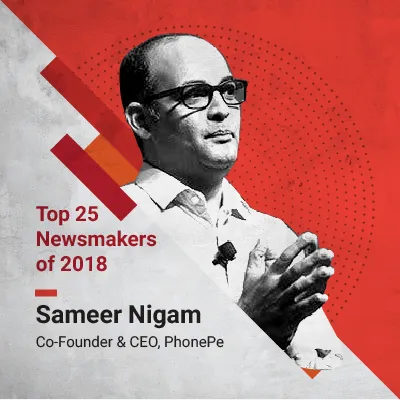
Milestone: Growth in UPI transactions
Who: Sameer Nigam, Rahul Chari, Burzin Engineer, Co-founders, PhonePe
Why: In 2018, Sameer Nigam-led PhonePe became one of the fastest growing payment apps, crossing the 1 million users mark and 1 billion transactions, in just over two years since it was founded in 2016. Earlier this year, PhonePe also overtook its rivals to become the leader in unified payments interface (UPI) transactions, accounting for 40 percent of market share, the company said, citing data from the National Payments Corporation of India (NPCI).
“A billion transactions is both exciting and humbling. The growth and adoption of PhonePe have surpassed all our expectations and we thank all our users for helping us achieve this incredible milestone. We’re also grateful to Flipkart, our parent company, for the constant source of support that it has provided us since inception. We would not have been able to scale up our operations this rapidly without their unwavering support,” Sameer said.
#24. Ashish Hemrajani, BookMyShow
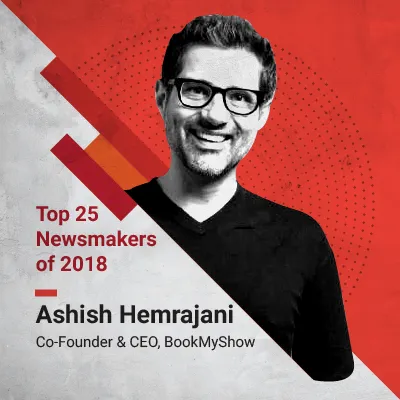
Milestone: Dominance in the entertainment market and growth in non-entertainment business
Who: Ashish Hemrajani, Co-founder and CEO, BookMyShow
Why: BookMyShow, India’s largest digital entertainment ticketing startup, is now aiming to expand its non-movie business revenue share to 50 percent by 2020. To this end, the company, while fending off competition from rivals such as PayTM, forayed into ticketing for sports, live entertainment and various experiences across international markets. The company has also made booking tickets for international events from India seamless. The online ticket booking platform also raised $100 million in Series D funding round from TPG Growth and existing investors Stripes Group, SAIF Partners, Accel Partners and Network 18.
#25. Mohit Tandon, Kapil Bharati, Suraaj Saharan, Bhavesh Mangalani, Sahil Barua, Delhivery

Milestone: Inching towards unicorn status, with robust growth in revenues
Who: Mohit Tandon, Kapil Bharati, Suraj Saharan, Bhavesh Mangalani, Sahil Barua, Co-founders, Delhivery
Why: Logistics startup Delhivery, the brainchild of Mohit Tandon, Kapil Bharati, Suraj Saharan, Bhavesh Mangalani, and Sahil Barua, is inching closer to acquiring unicorn status, based on reports that SoftBank is in talks to invest about $450 million in the company. The startup is also exploring a potential IPO in the next few months, which would make it the first e-logistics listing in the country.
Starting out as a hyperlocal express delivery service for brick-and-mortar stores with just a handful of delivery boys in 2011, Delhivery has evolved into a complete supply-chain solution providing core e-commerce technology and logistics services in the e-commerce space. The Delhi-based logistics startup, valued at around $800 million, is among a growing list of Indian startups poised to join the unicorn club next year.
And finally…
Read, share and let us know who you thought made the most of the year that was, and who will continue to lead and inspire in 2019.
“After all, we make ourselves according to the ideas we have of our possibilities.”
On the lines of the above quote from V S Naipaul, we look forward to newer possibilities and milestones that we expect to see from YourStory’s list of Top 25 Newsmakers of 2018 in the Indian startup ecosystem in the year ahead.
(Research and design inputs from Anish Menon, Aditya Ranade, Nileena G.S., and Anisha Tulika)







